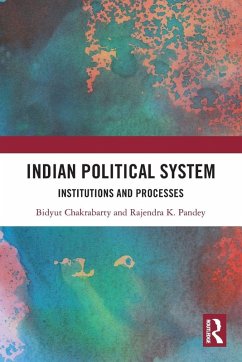
Mamata Banerjee (A Beacon of Women Leadership in Indian Politics)

PAYBACK Punkte
10 °P sammeln!
In a diverse democracy like India, leadership assumes many forms-charismatic, grassroots-driven, and resilient. Mamata Banerjee, often affectionately called "Didi," exemplifies all these qualities. From her early political struggles to becoming the Chief Minister of West Bengal, her journey reflects tenacity, vision, and a deep connection with the people. This book seeks to present a comprehensive and balanced account of Mamata Banerjee's political life, her achievements, challenges, and controversies. It is not merely a biography; it is an analysis of her leadership style, governance philosop...
In a diverse democracy like India, leadership assumes many forms-charismatic, grassroots-driven, and resilient. Mamata Banerjee, often affectionately called "Didi," exemplifies all these qualities. From her early political struggles to becoming the Chief Minister of West Bengal, her journey reflects tenacity, vision, and a deep connection with the people. This book seeks to present a comprehensive and balanced account of Mamata Banerjee's political life, her achievements, challenges, and controversies. It is not merely a biography; it is an analysis of her leadership style, governance philosophy, and impact on women's empowerment, regional politics, and federalism in India. Through this work, readers will gain insight into: · The political and social context of West Bengal. · Mamata Banerjee's administrative strategies, welfare policies, and crisis management. · Her symbolic significance in feminist politics and federalist advocacy. · The controversies and criticisms she has faced, offering a balanced perspective. The intention behind this book is to encourage critical reflection, informed discussion, and deeper understanding of contemporary Indian politics, through the lens of one of its most influential and complex leaders. The book succeeds in capturing the essence of Mamata Banerjee's political journey, from her early grassroots activism to her prolonged tenure as Chief Minister of West Bengal. It provides readers with: Comprehensive Coverage: Each chapter delves into a distinct aspect of her career, governance, and social impact-ranging from education and women's empowerment to federalism and crisis management. The inclusion of pros and cons for key policies and decisions adds analytical rigor. Balanced Perspective: The manuscript does not shy away from discussing controversies, criticisms, and challenges, including corruption allegations, electoral violence, and central-state tensions. Yet, it equally acknowledges her resilience, mass appeal, and policy achievements, providing a nuanced portrayal. Contextual Depth: The author situates Mamata Banerjee within the political, social, and cultural landscape of West Bengal and India, offering both historical context and contemporary relevance. This makes the book valuable for both general readers and scholars. Engaging Narrative: The writing is accessible, well-structured, and informative, blending factual reporting with reflective commentary. Chapters such as the epilogue, "Didi and the Destiny of Indian Democracy", provide a thoughtful, symbolic perspective on her role in feminist and federalist politics. Utility for Scholars and Citizens Alike: The manuscript serves as a reference for political analysts, students, and policymakers, while also being readable and engaging for general audiences interested in Indian politics.













